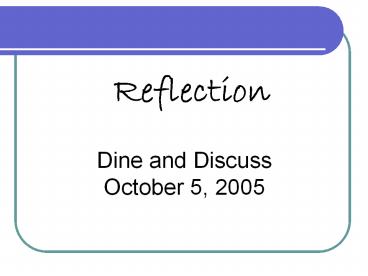Reflection - PowerPoint PPT Presentation
1 / 14
Title:
Reflection
Description:
... Types of Learning Styles. Activist. Reflector. Theorist ... Classic literature. Appeals to Theorists: they learn best through abstract conceptualization ... – PowerPoint PPT presentation
Number of Views:196
Avg rating:3.0/5.0
Title: Reflection
1
Reflection
Dine and Discuss October 5, 2005
2
Concrete Experience Feeling/ Sensing
Kolb's Experiential Learning Styles
Reflectors (Diverging) feel watch
Activists (Accommodating) feel do
Reflective Observation Watching/Reviewing
Active Experimentation Doing/Planning
Perception Continuum How we think about things
Processing How we
Continuum do things
Theorists (Assimilating) think watch
Pragmatists (Converging) think do
Abstract Conceptualization Thinking/Concluding
Adapted from Alan Chapman 2005
3
Four Types of Learning Styles
- Activist
- Reflector
- Theorist
- Pragmatist
4
ACTIVIST
- Acts first, considers the consequences later
- Focuses on the present
- Ill try anything once philosophy
- Tackles problems by
- brainstorming
- Thrives on challenges
- bored by implementation
5
REFLECTOR
- Ponders experiences and observes
- Seeks data and considers thoroughly
- Postpones decision making until all information
is collected - Watches and listens before
- offering an opinion
6
THEORIST
- Approaches problems using vertical, step by step
approach - Pulls together disparate fact into coherent
theories - Seeks perfection
- Dislikes flippancy and
- uninformed decision-making
7
PRAGMATIST
- Displays practical problem-solving and
decision-making skills - Sees problems as opportunities
- Acts quickly and confidently to implement ideas
- Dislikes ruminating and open-ended discussion
8
Learning to ride a bike
- Reflectors think about riding and watch others
ride - Theorists want a clear grasp of the concept of
riding a bike - Pragmatists Seek practical tips from a biking
expert - Activists Leap on the bike and give it a try
9
Selecting Reflection Activities
10
READING Literature and Written Materials
- Case Studies
- Books about social issues
- Government documents
- Professional journals
- Classic literature
- Appeals to Theorists they learn best through
abstract conceptualization
Eyler,Giles,Schmiede 1996
11
WRITING Written Exercises
- Blogs (Web-based logs)
- Journals and logs
- Reflection essays
- Self-evaluation essays
- Critical Incident Report
- Portfolios
- Analysis papers
- Case studies
- Grant proposals
- Press releases
- Drafting legislation
- Letters to other students/clients/self/politicians
- Published articles (newspaper, newsletter,
journals) - Volunteer/Agency training manuals
Appeals to Theorists and Reflectors
Eyler,Giles,Schmiede 1996
12
DOING Projects and Activities
- Simulations
- Conducting interviews
- Art journal
- Role playing
- Collecting photos, creating slide or
- PowerPoint presentations
- Watching movies/videos
- Presentations involving dance, music, or
theatrics - Planning public relations events for the agency
- Analyzing or creating agency budgets
- Program development
- Appeals to activists
Eyler,Giles,Schmiede 1996
13
TELLING Oral Exercises
- Focus groups
- Informal discussions
- Formal class discussions
- Presentations
- Teaching a class
- Story telling
- Individual conferences with faculty or community
partner - Legislative testimony
- Appeals to activists
14
Mapping S-L Reflection
Before During After
Alone Letter to myself Structured journals Reflective essay Letter of advocacy
With Classmates Hopes and fears discussion Theatre Mixed team discussion Team presentation Collage, mural, video, photo essay
With Community Partners Asset mapping Planning w/ community Lessons learned, debriefing Presentation to community group
(Source Eyler, Creating your Reflection Map































